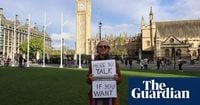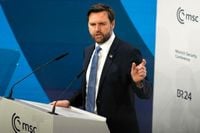The US State Department has made a rare intervention in British politics, warning of its concerns about freedom of expression in the United Kingdom. The department, responsible for US foreign policy, issued a statement on X, formerly Twitter, highlighting fears about the prosecution of anti-abortion campaigner Livia Tossici-Bolt. Tossici-Bolt faces criminal charges for offering conversation with patients seeking abortions within a legally prohibited "buffer zone" outside a clinic.
In its statement, the State Department said, "We are monitoring her case. It is important that the UK respect and protect freedom of expression." This sentiment echoes Vice President JD Vance's previous remarks about the state of free speech in the UK, emphasizing the mutual respect for human rights and fundamental freedoms shared between the US and UK.
The State Department's concerns are not isolated; they follow a similar incident where police in Scotland were criticized for their handling of protests near abortion clinics. The timing of this intervention coincides with a visit by a senior advisor from the Bureau of Democracy, Human Rights, and Labor (DRL) to the UK in March, during which they met with Tossici-Bolt, who leads an anti-abortion group called 40 Days for Life Bournemouth.
Tossici-Bolt, who was on trial at Poole Magistrates’ Court in February, is accused of breaching the Public Spaces Protection Order on two days in March 2023. A verdict on her case is expected on Friday, April 4, 2025. She was prosecuted for holding a sign near a Bournemouth abortion clinic that read: "Here to talk if you want to." Buffer zones are designed to prevent harassment of women seeking abortions, prohibiting actions that might influence their decisions or cause distress.
In response to the US intervention, Tossici-Bolt expressed her gratitude, stating, "I am grateful to the US State Department for taking note of my case. Great Britain is supposed to be a free country, yet I've been dragged through court merely for offering consensual conversation." She lamented the UK’s perceived decline in free speech, adding, "It deeply saddens me that the UK is seen as an international embarrassment when it comes to free speech." Tossici-Bolt's case has sparked fears among some that it may impact the UK's ability to secure a trade deal with the US, with one source claiming, "There should be no free trade without free speech."
However, British Business Secretary Jonathan Reynolds has downplayed the significance of free speech issues in ongoing trade negotiations. In an interview with Times Radio, he stated, "It’s not been part of the trade negotiations that I’ve been part of," and emphasized that discussions with the US administration have focused on broader economic engagement rather than specific issues of free expression.
As the situation unfolds, the UK government is bracing for the impact of Donald Trump's long-promised global tariffs, set to take effect on Wednesday, April 2, 2025. These tariffs, dubbed "Liberation Day" by Trump, are expected to apply to all countries, raising concerns about their potential repercussions on the UK economy. Reports indicate that an economic deal with the US, which includes concessions on agriculture, is reportedly "on the table and ready to sign," suggesting that the negotiations are ongoing despite the tensions surrounding free speech.
Sir Keir Starmer, the leader of the Labour Party, has been striving to secure a free trade deal with the US since taking office. However, the ongoing free speech controversy poses a risk to these efforts. Starmer acknowledged the likelihood of tariffs impacting the UK, stating, "The likelihood is there will be tariffs. Nobody welcomes that. We are obviously working with the sectors most impacted at pace on that." He emphasized that all options remain on the table in response to the tariffs, indicating a willingness to protect British interests.
During a recent phone call with Trump, Starmer faced the reality of impending tariffs, which could further complicate trade relations. The Prime Minister's official spokesperson reiterated the importance of allowing women to make choices regarding abortion services without facing harassment, underscoring the government's commitment to maintaining buffer zones around clinics.
In the backdrop of these developments, the US State Department's intervention has raised questions about the UK's commitment to free speech and human rights. As tensions rise over trade negotiations and the implications of Trump's tariffs, the outcome of Tossici-Bolt's case may serve as a litmus test for the strength of US-UK relations moving forward. The Office for Budget Responsibility has warned that a trade war, in which the UK retaliates against US tariffs, could significantly harm the UK economy, potentially knocking one percent off GDP.
As the situation continues to evolve, analysts are closely monitoring the potential fallout from the impending tariffs and the broader implications for US-UK relations. With recession fears looming, the stakes are high for both countries as they navigate the complexities of trade, free speech, and human rights. The coming days will be crucial in determining how these intertwined issues will play out on the international stage.






